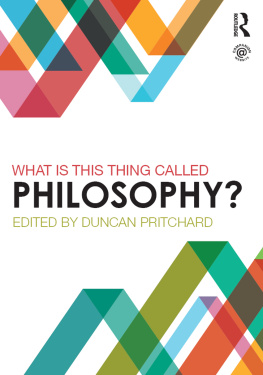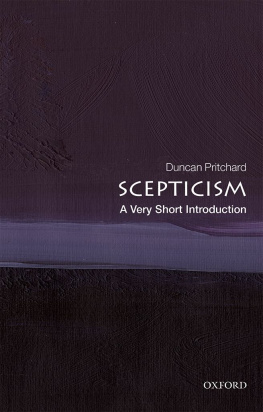CONTEMPORARY SKEPTICISM
OXFORD BIBLIOGRAPHIES ONLINE RESEARCH GUIDE
Duncan Pritchard
University of Edinburgh
2011 by Oxford University Press, Inc.
ISBN: 9780199809103
TABLE OF CONTENTS
OXFORD BIBLIOGRAPHIES ONLINE RESEARCH GUIDE
From
OXFORD BIBLIOGRAPHIES ONLINE | Philosophy
Authority and Innovation for Scholarly Research Written by a leading international authority and bearing the Oxford University Press stamp of excellence, this article is a definitive guide to the most important resources on the topic. The article combines annotated citations, expert recommendations, and narrative pathways through the most important scholarly sources in both print and online formats. All materials recommended in this article were reviewed by the author, and the article has been organized in tiers ranging from general to highly specialized, saving valuable time by allowing researchers to easily narrow or broaden their focus among only the most trusted scholarly sources. This is just one of many articles within the subject area of Atlantic History, which is itself just one of the many subjects covered by Oxford Bibliographies Onlinea revolutionary resource designed to cut through academic information overload by guiding researchers to exactly the right book chapter, journal article, website, archive, or data set they need.
WHY OBO?
For faculty and researchers:
- Jumpstarts the research process by directing you to the best print and online sources available
- Offers high-level overviews of scholarship to get you quickly up to speed on topics outside your area of expertise
- OpenURL and full-text DOIs offer seamless linking to your librarys catalog, OCLC WorldCat, and Google Books
- Provides a useful tool for preparing syllabi, writing and research assignments
For undergraduate and graduate students:
- Provides undergraduates with an indispensable introduction to the literature on major and minor topics within their field
- Promotes critical thinking about sources and gives students the means to negotiate and identify quality scholarship
- Helps graduate students prepare for qualifying exams, providing guidance on key works of scholarship
For Librarians:
- Designed in consultation with active researchers, Oxford Bibliographies Online offers an essential resource for managing academic information overload
- Expert recommendations on the best works availablefrom books and journal articles to archives, websites, and data setsmakes this the ultimate collection development tool
- Increases usage of the online journals and databases your institution subscribes to by seamlessly directing researchers to those sources
- Supports print discoverability by allowing patrons to link directly to the online catalog through OpenURL and full-text DOIs
* Functionality available through the oxfordbibligoraphiesonline.com platform only
To learn more, visit www.oxfordbibliographiesonline.com or send this form to your librarian to benefit from an institution-wide FREE trial.
INTRODUCTION
The problem of skepticism is one of the key topics in philosophy, both in terms of the history of the subject and the contemporary literature. This entry focuses on the contemporary discussion, which has tended to be largely concerned with the particular skeptical question of whether widespread knowledge of the world is possible.
GENERAL OVERVIEWS
There are a number of introductory overviews of the skeptical debate currently available, though they can vary quite a lot in terms of what they offer and the extent to which they are up-to-date on recent developments. Klein 2005 offers a very comprehensive and up-to-date overview of the contemporary literature on skepticism, and it also has the advantage of being freely available online. Klein 2002 is also fairly up-to-date and comprehensive, albeit not to the same degree. Pritchard 2002 offers a comprehensive and up-to-date survey of the contemporary literature on skepticism. Although DeRose 1999 is an introduction to an edited collection, the comprehensive nature of the volume in question means that it covers all the main issues. Williams 1998 offers a quite partisan treatment of the debate, but since Williams is one of the main figures working on these issues, this is nevertheless a helpful contribution. Vogel 2005 offers a critical response to the problem of skepticism, to which Fumerton 2005 responds. Read together, these two articles are very useful if one wishes to get a grip on the opposing positions that are available in this respect (i.e., skepticism and anti-skepticism). Cohen 1998 is the shortest of the pieces listed here, but it is still useful if one wants to get a very quick grasp of the main issues.
Cohen, S. Scepticism. In Routledge Encyclopedia of Philosophy . Vol. 8. Edited by Edward Craig, 795796. London: Routledge, 1998.
This is a very short introduction to the contemporary debate, and so it leaves a lot out. Still, it flags the main issues, and therefore would be of use to someone who wanted a very quick overview of the topic.
DeRose, Keith. Introduction: Responding to Skepticism. Skepticism: A Contemporary Reader . Edited by Keith DeRose and Ted A. Warfield. Oxford: Oxford University Press, 1999.
A very good introduction to the contemporary debate, one that also covers, unusually, semantic externalist responses to the skeptical problem. Also accords more status to skepticism-friendly treatments of the problem than is usual. This is an introduction to an anthologyone of the key anthologies on the contemporary debate regarding skepticism presently availableand so proceeds for the most part by summarizing and discussing the papers collected in this anthology.
Fumerton, Richard. The Challenge of Refuting Skepticism. In Contemporary Debates in Epistemology . Edited by Matthias Steup and Ernest Sosa, 8597. Oxford: Blackwell, 2005.
Essentially a defense of a broadly skepticism-friendly position. Note that this article is a response to Vogel 2005, who offers a defense of the opposing, anti-skeptical, position. Reading the two articles together thus provides a good sense of what is at issue in the debate regarding skepticism.
Klein, Peter. Skepticism. In Oxford Handbook of Epistemology . Edited by Paul K. Moser. Oxford: Oxford University Press, 2002.
A very good article on the contemporary literature on skepticism.
Klein, Peter. Skepticism
URL: (http://plato.stanford.edu/entries/skepticism/). In Stanford Encyclopedia of Philosophy . Edited by Edward N. Zalta. 2005.
A very comprehensive state-of-the art entry on the contemporary literature, and freely available online. Note that this article overlaps to a certain degree with Klein 2002, but it covers more ground and is more up-to-date.
Pritchard, Duncan. Recent Work on Radical Skepticism. American Philosophical Quarterly 39.3 (2002): 215257.
This is the only formal survey of the recent literature on the skeptical problem, and it offers a fairly comprehensive account of the main views.
Vogel, Jonathan. The Refutation of Skepticism. In Contemporary Debates in Epistemology . Edited by Matthias Steup and Ernest Sosa, 7285. Oxford: Blackwell, 2005.
Essentially a defense of an anti-skeptical stance. Note that this article is responded to by Fumerton 2005, who offers a defense of the opposing position. Reading the two articles together thus provides a good sense of what is at issue in the debate regarding skepticism.
Williams, Michael. Skepticism. In The Blackwell Guide to Epistemology . Edited by John Greco and Ernest Sosa. Oxford: Blackwell, 1998.
DOI: 10.1111/b.9780631202912.1998.x
This is a somewhat partisan introduction to the debate, but it is nonetheless a very useful account in that it offers an influential perspective on the issues, one informed from a broadly contextualist outlook on the problem.
Next page


